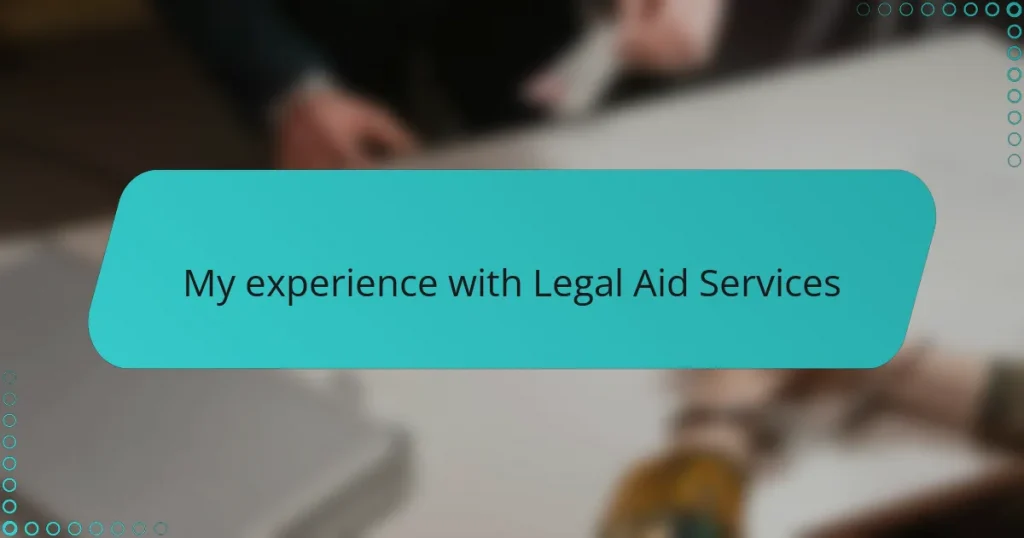Key takeaways
- Legal aid services provide crucial support beyond free legal advice, offering guidance and emotional reassurance during overwhelming situations.
- Different forms of legal aid, including advice, representation, and specialized assistance, serve as vital lifelines tailored to individual needs.
- Qualifying for legal aid involves understanding income criteria and specific legal issues, with thorough preparation essential to navigate the application process successfully.
- Clear communication and persistence are vital for a successful legal aid experience, helping to regain confidence and control throughout the journey.
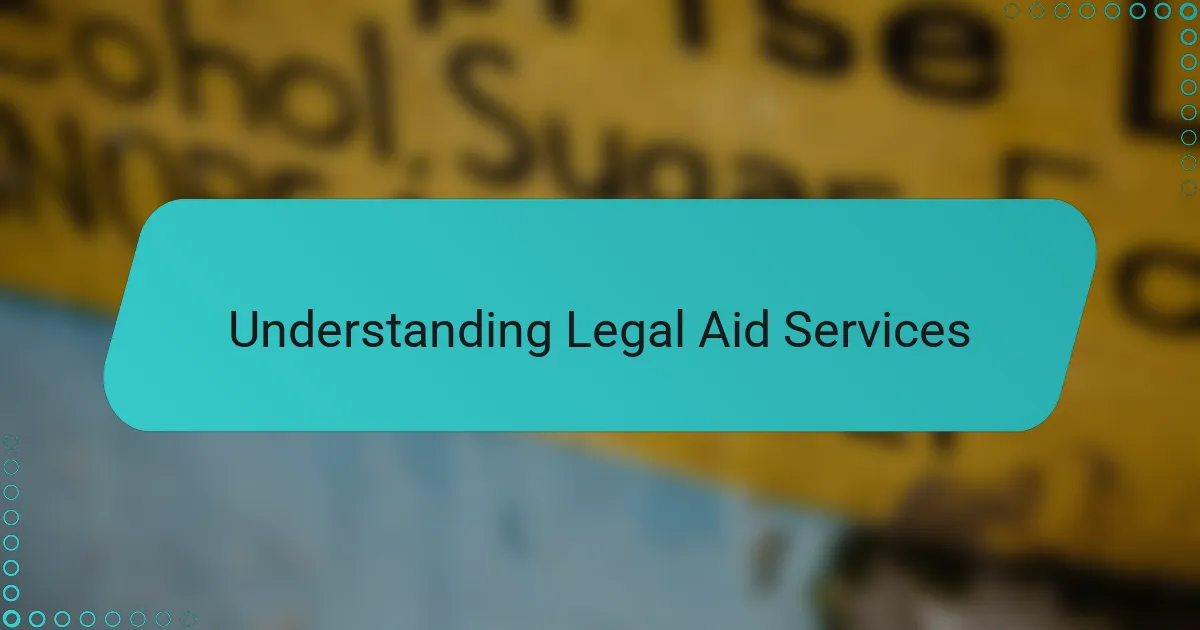
Understanding Legal Aid Services
Legal aid services often get misunderstood as just free legal advice, but in my experience, they are so much more—they provide real support when navigating complex legal systems feels overwhelming. Have you ever felt lost facing paperwork or court procedures? That was me, and legal aid became my guiding light in those moments. What struck me most is how these services don’t just offer legal help but also restore a sense of hope and control during stressful times.
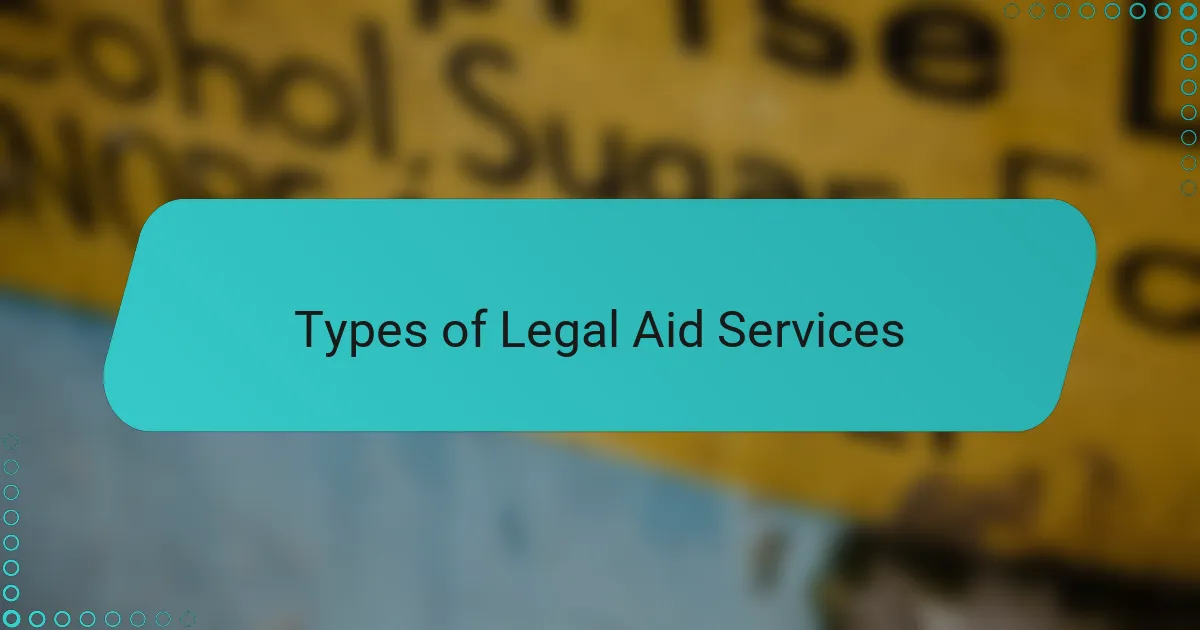
Types of Legal Aid Services
Legal aid services come in many forms, and each one played a unique role during my journey. There’s advice and consultation, which is often the first step, helping me understand my rights and options without drowning in legal jargon. I remember feeling so relieved after just one session clarified what I was actually up against.
Beyond advice, there’s representation, where lawyers take the helm and speak on your behalf in court or negotiations. At one point, I needed someone to stand up for me when I was too overwhelmed to even express my concerns clearly. That kind of support made all the difference—it felt like having a trusted ally in a challenging fight.
Then, there are specialized services, like help with paperwork, mediation, or even workshops that empower you to handle certain matters yourself. Have you ever been stuck staring at endless forms with no idea where to start? Legal aid teams helped me break down the steps, making the process manageable and less intimidating. In my experience, these different types of aid aren’t just services—they’re lifelines tailored to what you need most.
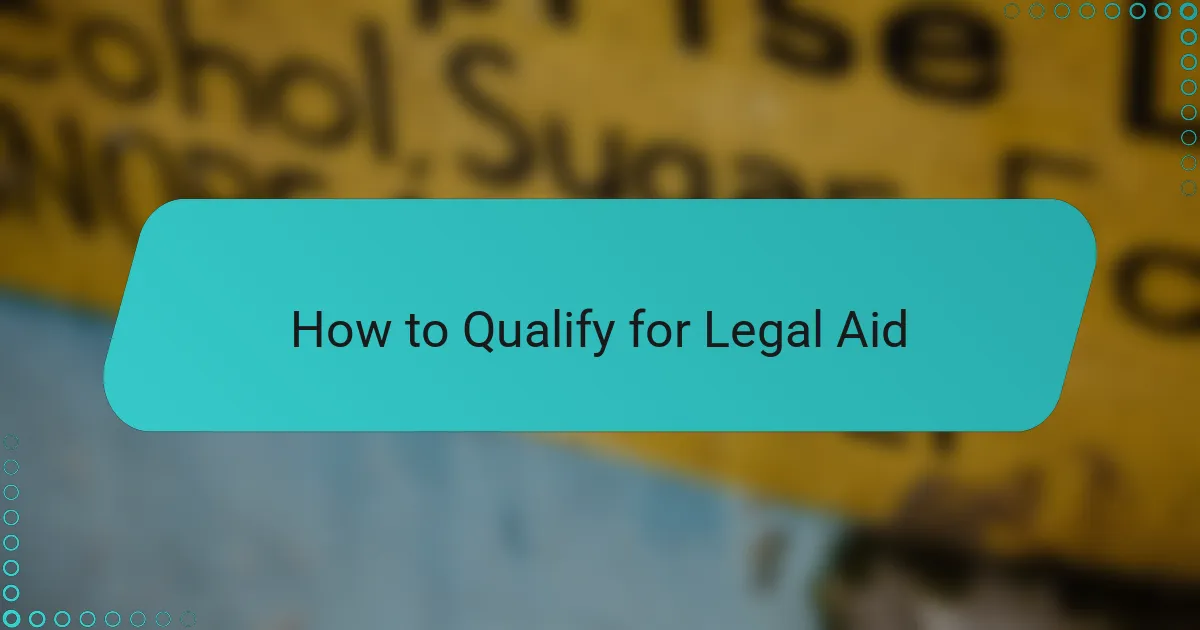
How to Qualify for Legal Aid
Qualifying for legal aid often begins with feeling unsure if you even meet the criteria. When I first looked into it, I learned that income level is a big factor—these services usually help those who can’t afford a private lawyer. Have you ever worried that your situation isn’t “bad enough” to get help? I had that doubt too, but turns out, qualifying isn’t about being the poorest of the poor; it’s about genuine need and financial limits set by each program.
Another part of qualifying involves the type of legal issue you’re facing. Not all cases are covered, so when I reached out, I was asked if my problem fit within their areas of help—like family law, housing, or certain benefits. It felt a bit daunting to explain my issue, but the staff always made it clear whether my case aligned with their services, saving me from unnecessary stress or false hope.
Lastly, the application process itself can feel like a barrier. I remember sitting with piles of documents trying to prove my income, residency, and other details. It was tedious, but knowing that this step could unlock crucial support kept me going. Have you ever been stuck wondering what evidence you actually need? Being prepared with recent pay stubs or bank statements can make the difference between quick approval and endless back-and-forth.
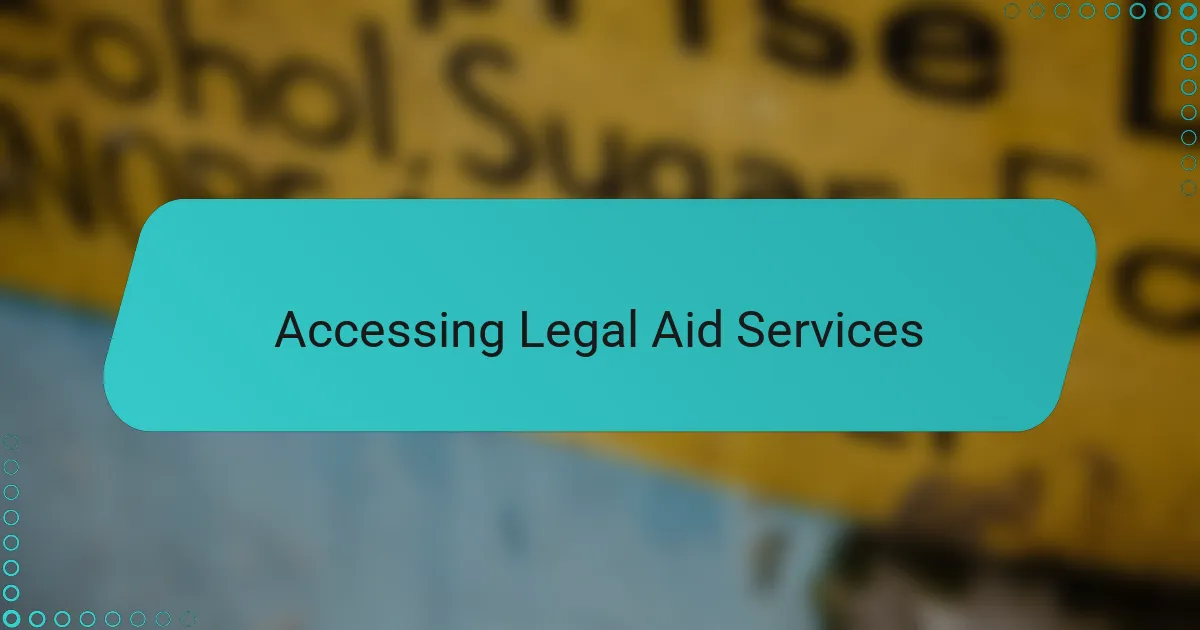
Accessing Legal Aid Services
Finding the right entry point into legal aid was trickier than I expected. I hesitated at first—where do you even start? Calling the local legal aid office was surprisingly straightforward, and the staff’s friendly voice instantly eased my anxiety. They walked me through the steps patiently, which made me feel like I wasn’t alone in this confusing maze.
Sometimes, accessing legal aid meant waiting—a bit longer than I hoped—because demand can be high and resources limited. There were moments I felt frustrated, wondering if my situation was urgent enough to justify the wait. But staying persistent and checking in regularly showed me that these delays don’t mean you’re forgotten; they’re part of a system trying to help as many people as it can.
I also learned how important it was to have all my paperwork ready before reaching out. Missing documents meant extra calls and delays, which can be discouraging when you just want answers. Preparing everything beforehand gave me a sense of control, and when my appointment finally came, it felt like the first tangible step toward resolving my legal challenges.
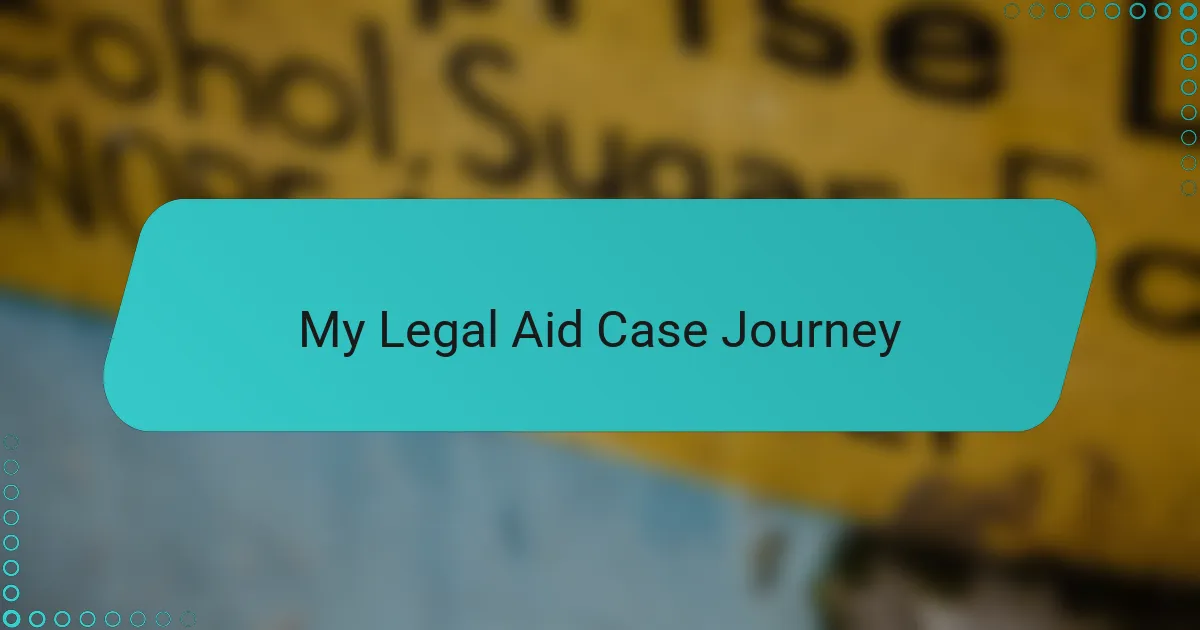
My Legal Aid Case Journey
My Legal Aid Case Journey began with a mixture of hope and uncertainty. I often wondered, could they truly understand the stress and confusion I felt? When my legal aid lawyer patiently listened and explained each step, it was like a weight lifting off my shoulders—finally, someone was on my side.
At times, the process tested my patience. There were moments when progress seemed slow, and I questioned if my efforts were in vain. But reflecting now, I realize those waiting periods taught me resilience and the importance of trust in the system.
One memory that stands out is when my legal aid representative stood with me during a hearing. I was nervous, almost overwhelmed, yet having that support meant I wasn’t just facing the challenge alone—it was a partnership. Have you ever experienced relief just knowing someone truly had your back? That’s what legal aid gave me.
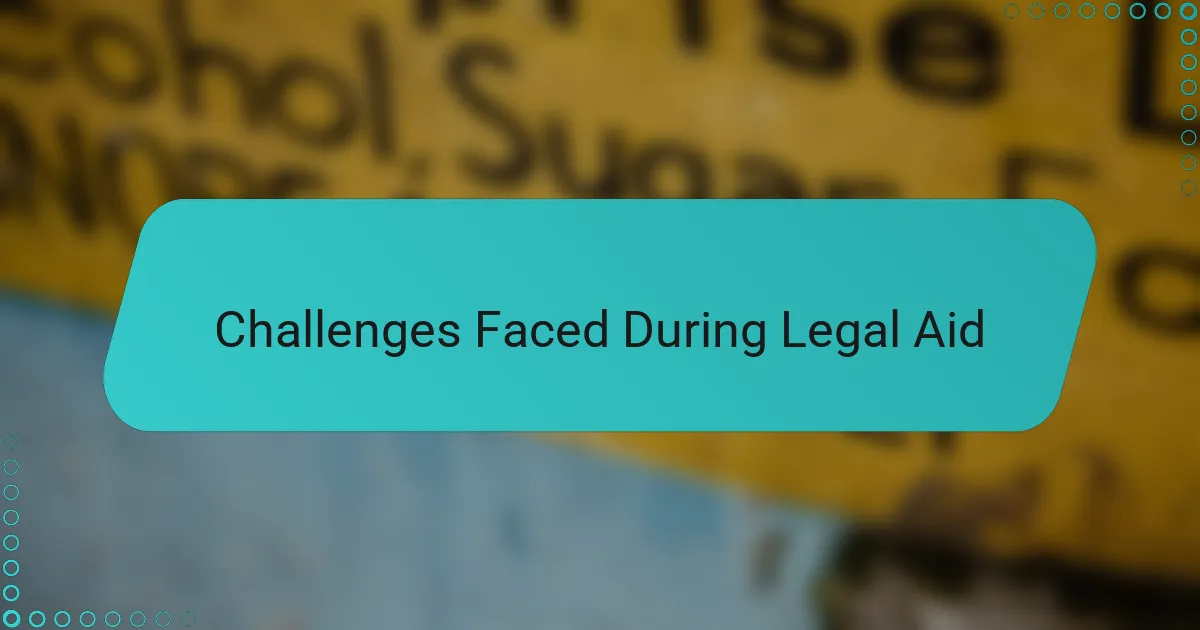
Challenges Faced During Legal Aid
There were definitely moments when I felt the weight of limited resources. Legal aid offices often juggle countless cases, which meant sometimes my calls or emails took longer to get a response. Have you ever waited anxiously, unsure if your matter was slipping through the cracks? That uncertainty can make an already stressful situation feel even heavier.
Another challenge was navigating the complex eligibility requirements. It wasn’t always clear which documents I needed or whether my case qualified, so I found myself jumping between phone calls and online forms trying to piece it all together. I remember feeling frustrated, wondering why something meant to help seemed so entangled in red tape.
And then, there was the emotional toll of the process itself. At times, the legal jargon and slow progress left me exhausted and doubting if I’d ever see a resolution. But looking back, those challenges taught me patience and the importance of perseverance when fighting for one’s rights. Have you ever faced a system that felt both supportive and overwhelming at the same time? That was my reality with legal aid.
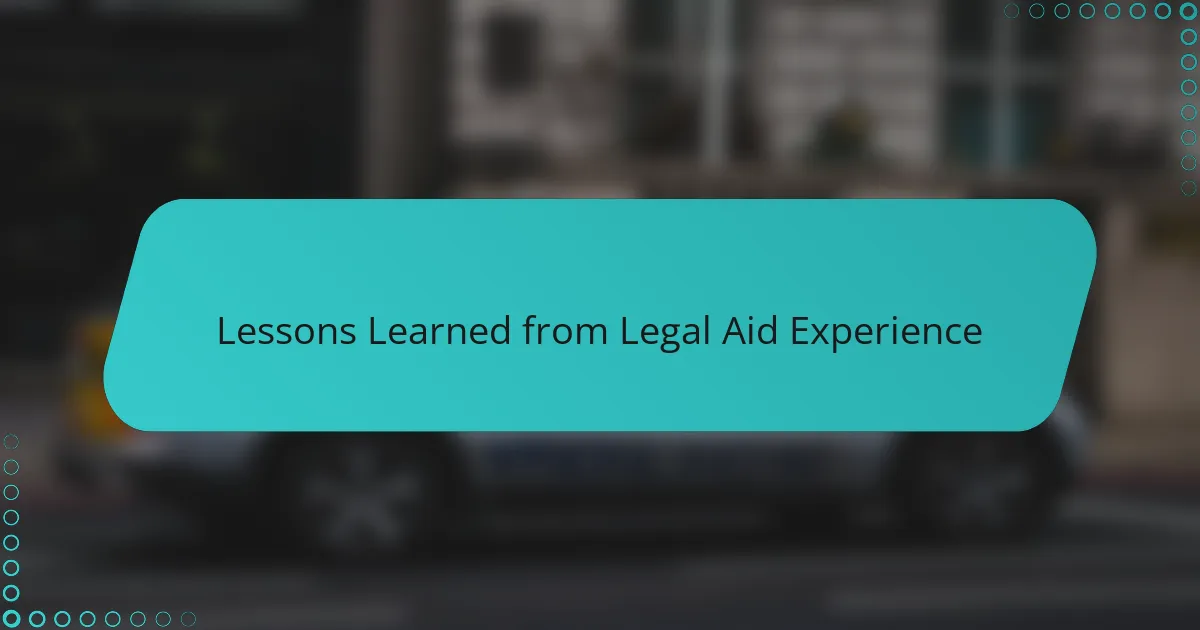
Lessons Learned from Legal Aid Experience
One lesson that really stayed with me is how crucial clear communication is in legal aid. I learned to ask questions—sometimes simple but important ones—because waiting in silence only added to my stress. Have you ever felt too intimidated to speak up? I realized that sharing my concerns openly actually made the whole process smoother and less daunting.
I also discovered the power of persistence. At one point, delays and slow responses tempted me to give up, but sticking with it revealed that real help often requires patience. It made me appreciate that legal aid is a resource stretched thin, yet still committed to fighting for people like me. Have you ever wondered if it’s worth the wait? In my experience, it absolutely is.
Lastly, I learned that legal aid isn’t just about winning a case—it’s about regaining confidence and control. When my lawyer explained every step and stood by me during court, I felt empowered rather than helpless. That emotional support made all the difference. Don’t underestimate how much a caring advocate can change your outlook in tough times.
